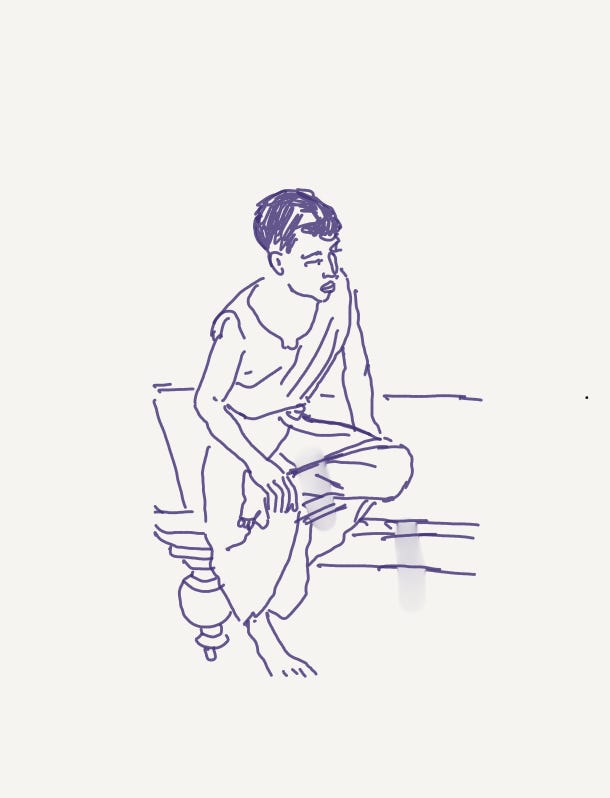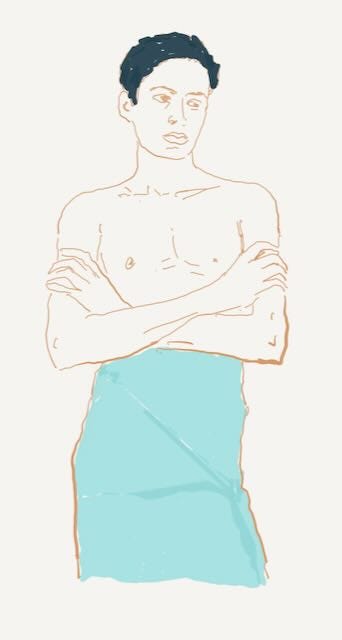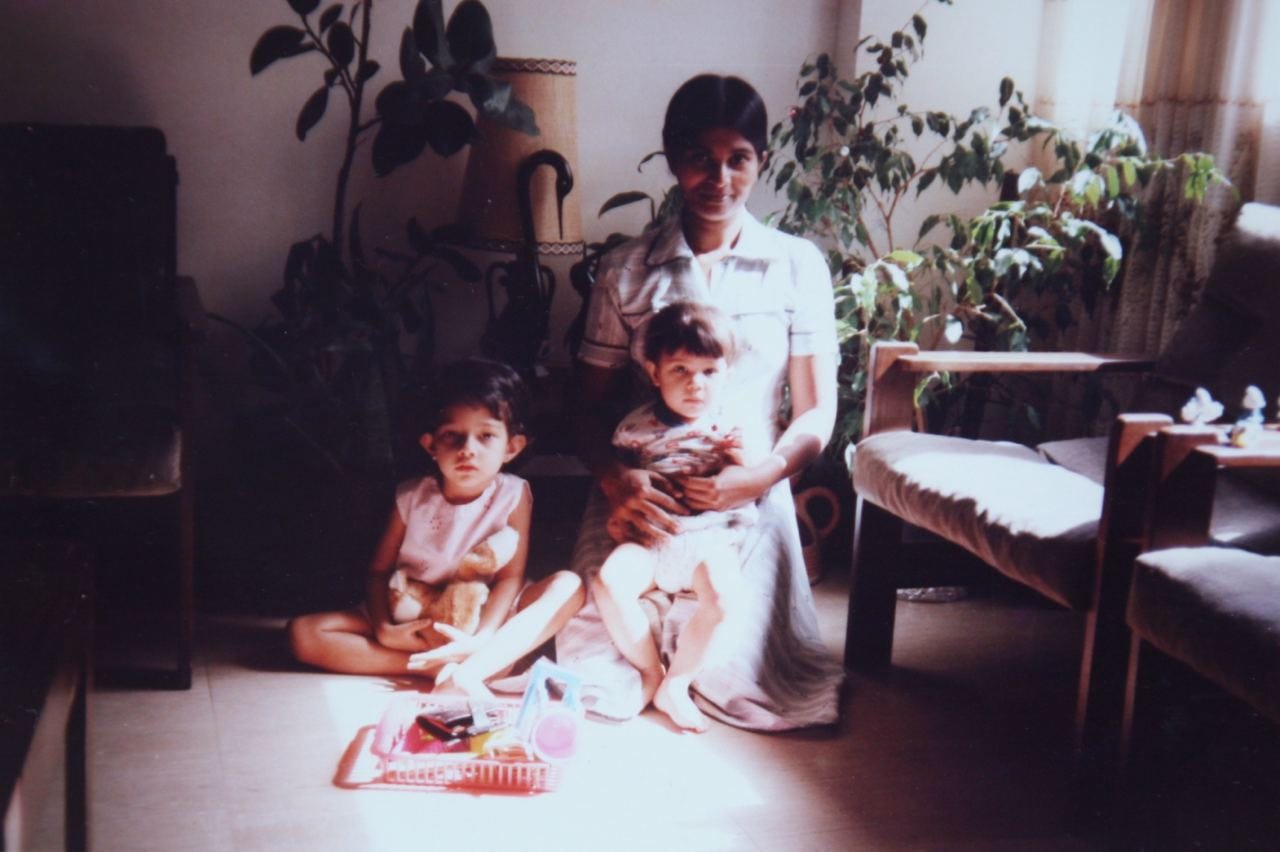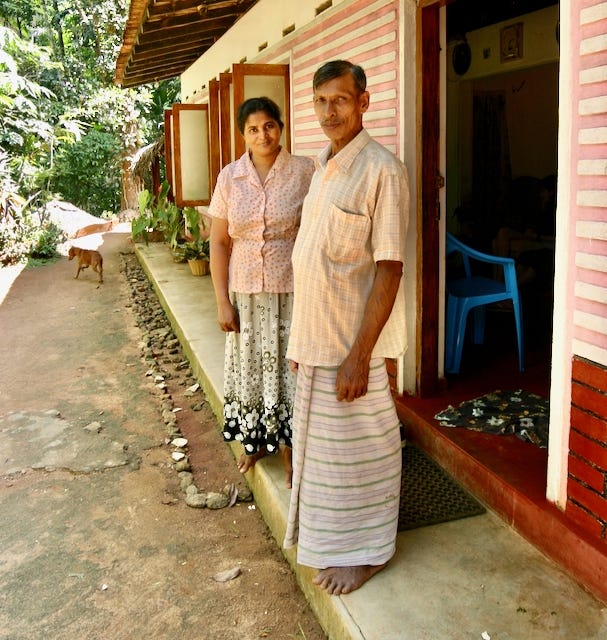Helpers
Helpers
A tribute to the helpers of the past — in times gone by in Sri Lanka and Dubai
Ihave mixed feelings about the helpers who helped my family and me in Sri Lanka and Dubai. Back in the day, helpers were called ‘servants’. Now, I find that term offensive and derogatory. I am ashamed of that past.
It was common in more affluent middle or upper-class homes to have helpers. Many of them were children themselves. In that embarrassing past, social inequity and imbalance allowed a privileged section of society to have poor children, men and women as helpers.
This is a tribute to the ‘helpers’ who helped my family and me. They were beautiful souls, helpless due to institutional poverty in a backwater country.
Unfortunately, and regrettably, I was part of that system.

My childhood memories begin with Gunapala, a boy hired to look after me. He was my constant companion and carer as early as I could remember. He stood guard for me, watching me for safety. Gunapala was a child himself, about thirteen years old. Unfortunately, he missed out on his education and instead was looking after a toddler. He wore a short sarong and was bare-chested.
His full-time job was to look after me and nothing else. I remember him as someone who devoted his life to protecting me. He stood guard for me as a great guardian. He carried me everywhere with kindness.
When I was about ten, my father was transferred to a regional town council south of Sri Lanka. My father lived in that town, visiting us once a month. My mother, without her husband, struggled with household chores and raising three small children under ten. On one of my father’s visits, he brought a young boy to help with the household.
His name was Pala, a dark boy. He was around my age, about ten years old. He wore a sarong, the norm for domestic helpers at the time. He had stopped schooling in grade three. His parents handed him to my father to earn a living as a domestic aide.
Pala was a great helper around the house to my mother. He could pull water from the water well, while I could not. He bathed me when my mother was too busy. He did minor shopping errands and cleaned the house. He swept our garden and watered the flower pots.
Pala was an active boy. For me, he was another playmate to play with and hang out with at home. We played together when we got a chance. He was good at playing marbles. He could hit marble balls with great accuracy and never missed a hit.
Pala was a natural among the plants and trees in our large garden. He made a catapult and showed me how to use it. He could climb fruit trees with ease. He taught me many outdoor skills, including how to climb trees.
On top of a tree during one of his climbs, his sarong loosened and fell. Alas, I could not stop laughing out loud at Pala standing naked on a guava tree. He was too embarrassed to come down without anything on him. Finally, he pleaded with me to pick up the sarong from the ground and throw it at him on the tree. He came down when I stopped laughing, and nobody was around to see him naked.
Pala talked about his younger brothers often. He missed his home and wanted to visit his parents and siblings. So my father took him back to his parents for a short visit. At the end of his holiday, Pala refused to return. Good on him!

Following Pala’s exit, my father brought another boy, Siripala. Siripala’s father worked as a labourer in my father’s workplace, the city council.
Siripala was different to Pala. He was not as playful as Pala. Siripala had a stronger southern accent. I struggled to understand him sometimes. In my innocence, I poked fun at his accent. He dressed his sarong and shirt elegantly and tied a belt on his waist. This was a big contrast to Pala, who did not wear a vest at home and was a bit of a wild boy. I had gotten used to being playful with Pala, and when Siripala did not join me in playing, I failed to understand that.
Siripala was always by himself. After a few months, Siripala also requested to return home. My father took him back on his return trip and released Siripala to his father.
After Siripala, a young girl, Kamala, came to our house as a domestic helper. Kamala helped my mother in the kitchen. She was young, around the same age as my younger sister. Kamala stayed with us for a couple of years.
At 13 years of age, I was in a Christian brothers boarding in my junior school away from home. Newton was the helper assigned to the boarding. Newtown was about seventeen years of age.
He and I became good friends despite our age gap. Newton knew the world's ways and was a massive fan of Spartacus movies. He could narrate the whole film, scene by scene. I was mesmerised by the superheroes he talked about just by listening to him. He wanted to study further and better himself, but his parents were too poor to afford his studies. His father approached the Christian brotherhood for help. The brothers placed him in the boarding school, where he became a helper.
Newton was also a great friend to my friend, Richard. We chatted with him in our spare time. Newton came looking for us when we returned from school.
Bro. Paul, our carer, was apprehensive about our friendship with Newton, a boy a few years older than us. He warned us to limit our company to Newton. As a result, we drastically cut down our interactions with Newton and kept minimum contact. Richard and I had no choice in this matter.

Fast forward a few years, I was now a father in the oil-rich emirate of Dubai, where I worked. My wife found it hard to manage the kids and the housework. My mother-in-law suggested that we sponsor a helper from Sri Lanka. She recommended Kanthi, whose mother had worked as a maid for my wife’s grandmother decades earlier. Despite being a mother herself to two young children, Kanthi agreed to travel to Dubai and become a maid to our family.
When Kanthi arrived in Dubai, my second child was only a few months old. Within another year, we had another child. She was a tremendous help and loved the little ones dearly. Kanthi could not speak to them in English. Despite the language barrier, she transcended her love for my children through her actions. They grew up in Kanthi’s loving care in Dubai. She was an awesome nursemaid.

Kanthi was a great cook and a diligent housekeeper. Despite being busy, she succeeded in cooking a fresh breakfast every day for me before I went to work.
Kanthi stayed with us until we left Dubai for Australia for about five years. Kanthi returned to Sri Lanka when we left.
My mother often relied on domestic workers to help with household chores in her old age. She had a woman named Soma. She was the daycare for my mother. Soma was a single mother with a son, an adolescent. She diligently sent him to school every day to break her poverty cycle. After leaving him at school, she came to my mother’s place and did the household chores, including cooking. My mother trusted her. Soma was kind to my mother.
Where are these great helpers today?
Gunapala returned to see me when I was a teenager in Sri Lanka. He had learnt to repair radios and attended a technical school to learn the craft. He was planning to set up a small workshop in his hometown. I have not heard from him since.
My attempts to locate Pala and Siripala in the southern town of Sri Lanka have not been successful.
I don’t know where Newton is today.
Fortunately for Kanthi, her second son worked hard on his studies, entered university and is in a well-paying job in Sri Lanka. I mentored him in his student days to escape poverty and social inequity.
Kanthi keeps in touch with my family to the day. My kids are now adults, and some are parents themselves. Kanthi glowed happily when she met my kids during a trip to my old country. Recently one of my kids had a video call with her. Kanthi was delighted to see one of my grandkids on video.

Kanthi still talks about her babies, my beloved kids. My kids remember her today with gratitude and often talk about the immense sacrifice Kanthi made, leaving behind her children.
I continued to help Soma for a few short years after my mother passed away. I’d assume her son must be grown up and in some way that Soma had managed to uplift herself since.
These are tragedies of poverty and resultant exploitations in Asian countries.
I look forward to when domestic helpers become a thing of the past. That day is fast approaching in Asian countries.
Images belong to the original owners.
Subscribe to my stories https://djayasi.medium.com/subscribe.
Comments
Post a Comment